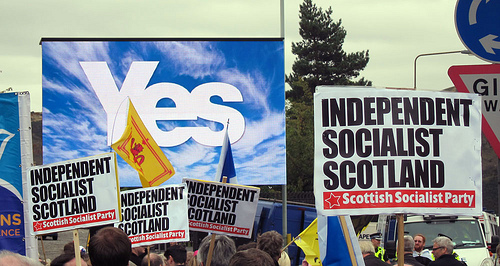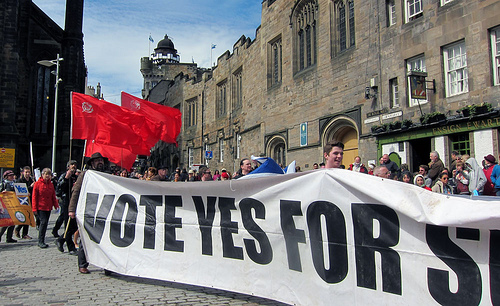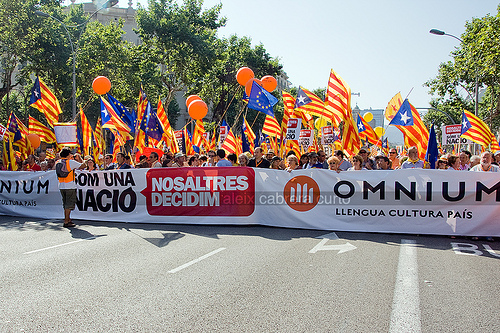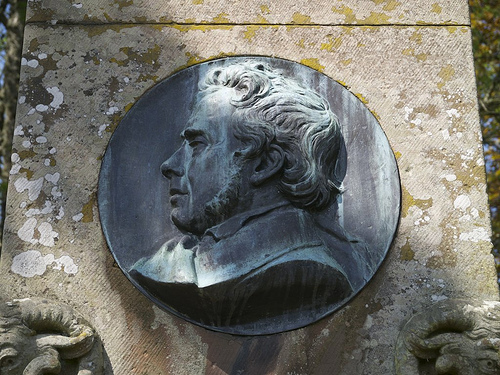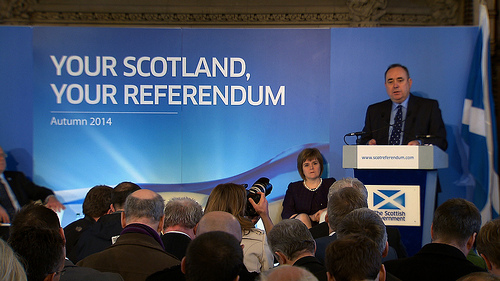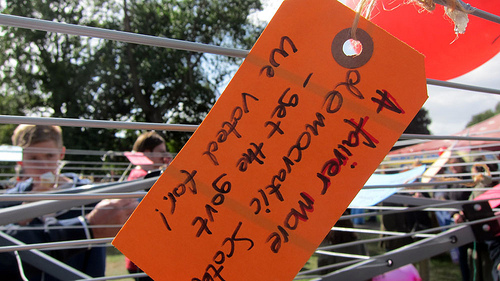
The prospect of independence for Scotland raises many vital questions related to the constitutional and democratic framework such a new state could create. Ben Wray is a member of the International Socialist Group, an activist in the Radical Independence Campaign and works for the Jimmy Reid Foundation as a researcher. In this article, written in a personal capacity, he examines some of these questions.
In this essay on democracy, I am going to work backwards. I’m going to start by looking at the ideal democracy for a socialist. I’m then going to look at what would be positive, intermediary steps in our current context that would help work towards this ideal future, as well as extending democracy to improve people’s lives in the here and now. I will look at this in the context of the independence referendum next year. Continuing the reverse order, I am then going to look at the SNP’s vision for democracy in an independent Scotland, which is the dominant one within the independence movement, and examine to what extent this will advance the cause of democracy and what the limitations of it are. Finally I’m going to end up at where we are now with Britain’s ‘representative democracy’, which I am going to define as ‘neoliberal democracy’.
The intention of this structure is to show a red thread that runs from our overall goals to our immediate tasks, that connects the socialist theory to the practical realities of our political context. In looking at it this way, hopefully what will become clear is that socialists cannot just engage in propaganda for a socialist democracy, but have to play a leading role in agitating for democratic advancement under capitalism and building coalitions and alliances with others who want to do the same.
This ‘war of position’ strategy, to put it in Gramscian terms, is the only way for socialists to build up the forces and the credibility in which our socialist democratic model will be on the agenda. Democracy is both our goal and our strategy, as Leon Trotsky put it “Socialism needs democracy like the human body needs oxygen”. This isn’t to say revolutionary changes aren’t also necessary, but like all previous transformations, the overcoming of capitalism will be part revolution and part transition – such is the dialectic of history.
Socialist Democracy
Democracy is at the heart of the socialist idea. Under capitalism, democracy is limited to a specific political sphere of elections every four or five years, whilst the economic aspects of life are dominated by the dictatorship of capital. Socialism eradicates the division between political and economic spheres of life: workers have democratic control over where they work, students over where they study, communities over where they live, and so on. And it is at this level – worker, student and community participative democracy – where elections take place for delegates to represent them at local, regional, national and international level. Those representatives are immediately recallable and their decisions revocable based on the democratic will of the majority.
How do we decide at what level decisions are made? Quite simply, enfranchisement should be based on the extent to which one is affected by the decision. Local parks affect people most in that particular communtiy, ditto schools, roads, sporting facilities and so on. Decisions over international trade will usually affect those at the national and international level and therefore delegation from community and worker level will be required.
What about when democratic council’s of people contradict? So for example, over pricing of goods which affects workers and consumers? Or the disposal of waste which affects workers, the wider community and the international community in terms of environmental harm? Worker’s councils are not the only form of council that will exist, they will coincide with consumer councils and environmental councils which will seek to come to common agreement, and if they can’t it will be delegated upwards to representative bodies that can come to agreement.
Therefore socialism is about a transformation of democracy, where participative democracy and a new, more accountable form of representative democracy combine into a coherent whole where accountability, responsibility and, ultimately, power starts from the bottom up.
Of course, we do not know exactly what a socialist democracy would look like until we get there. The whole idea is premised upon the creative energies of ordinary people to shape their own future, and therefore it is not just impossible but also contradictory to our methodology to say ‘this is exactly how socialism would work’.
Neither is there one vision for a socialist democracy. My very basic outline above takes more from the ‘participative economics’ school like Robin Hahnel and Michael Albert, but other socialists would have extensive criticism’s of Hahnel and Albert. The details are not important here, what is important is to identify socialism as being about the democratisation of economic, social and political life so that inequalities are undermined by a structure that puts everyone on an even level with equal access and distribution of wealth and power.
Transitional steps
How do we work towards this goal of a socialist democratic model? We should have learned by now that simply to proclaim it will never be good enough. There has been a long tradition of propagandism in the British socialist movement going back to the Social Democratic Federation in the 19th Century who, much to the annoyance of Marx and Engels, shunned struggles in the real world as ‘a distraction’ in favour of study circles and public forums that proposed a socialist future without providing any realistic strategy to get there. More recently, British Trotskyism has raised ‘the programme’ up as the pinnacle in socialist thinking. Trotsky had written ‘The Transitional Program: The Death Agony of Global Capitalism and the Tasks of the Fourth International’ in the context of a struggle between socialists and fascists across Europe during the 1930’s recession and an imminent second world war. Many Trotskyists have followed this model dogmatically, which was specific to Trotsky’s context where socialist revolution was on the agenda, and the results have been continual failure.
Propagandism has failed because it does nothing to relate to the political context as it exists in the real world. It is abstract and utopian and, therefore, entirely unconvincing to the vast majority of working class people.
The majority of people do not make political choices based on ideologies and programmes, but on answers to the most important problems they are facing in the here and now. Our aim therefore should be to find answers that are feasible given the political context and at the same time point the way towards our ultimate goal. If we can prove that our answers are better than others, then they are more likely to listen to what we say the next time we propose something. At the same time, if we can implement some of our transitional measures, they should by their very nature help to empower and embolden working class people to go further.
We therefore need transitional, or intermediary, steps. Steps that may seem very limited compared to our aims but taken in the context of the political situation as a whole, may be perceived as extremely ambitious to most people.
So, what would these transitional steps be specifically in terms of democracy in the context of the Scottish independence referendum?
Industrial Democracy:
The empowerment of workers is the cornerstone of a socialist democratic model, but proposing workers control of all industries is not something that could feasibly happen in the present context of hyper-neoliberal Britain. We therefore have to propose measures which extend the democratic rights of workers and trade-unions and, where possible, propose a model of public ownership which is democratic and bottom-up.
The bare minimum is that workers rights in Britain should be able to match the best standards in Europe. Britain has some of the worst employment rights in Europe and is 26th out of 27 on a measurement of worker-participation, only ahead of Lithuania. A new Jimmy Reid Foundation paper proposes an industrial democracy model for Scotland which includes basic trade-union and employment rights: universal collective bargaining rights for recognised trade-unions regardless of the trade-union density existing in the workplace, full rights to strike and picket, compensation rights over unfair dismissal and employee buy-out rights. It also includes worker-participation and board-level representation rights: day-to-day staff-related affairs would be run by joint committee’s of staff and management and workers and trade-union representatives would be entitled to 1/3rd of seats on company boards with the same rights as other board representatives such as full access to company accounts.
These measures proposed do not fundamentally challenge property relations, but should be seen in the current political context. The situation at Grangemouth for example, where trade-unions were trampled over and workers were lied to and Royal Mail privatisation where the government privatised quicker than workers were able to strike. In this context these proposals are a step towards workers democracy because they mean the idea of workers having a say in how companies are run is registered on the political map. Once workers start becoming used to having a say, it is more likely they are going to want more. Therefore measures which strengthen trade-unions and embolden workers can only be positive.
In terms of public services, Andy Cumbers new book Reclaiming Public Ownership outlines extensively how democratisation of public services is not only fairer, but more efficient. In bigger insitutions, like the NHS, where there has been cases of management bullying and worker exhaustion, in NHS Lothian for example, staff councils should elect representatives to sit on the board, along with input from service users who should also have representation. The idea is to build a structure which breeds a culture whereby those who do the work believe they are the ones who shape how it is organised.
Smaller organisations such as mutuals and co-operatives should be encouraged where workers can run enterprises themselves.
Radical Decentralisation
This notion of self-governance should be extended to local democracy. First, in terms of using national resources for the collective interest. For example if you look at the renewables industry, whilst it may only be profitable for companies to organise on a national basis, it is easier and cheaper for many communities to supply their own energy because the wind blows and the sun shines where they live. In Denmark, 80 per cent of the wind energy sector is community owned.
Secondly, in terms of organising the distribution of public services. Local councils in Scotland are not really local and therefore are not really democratic as there are few lines of accountability between the citizen and their representatives. Scotland has the least local ‘local democracy’ in Europe. Subsequently, private capital and local councils are often in league with each other, which is why many are rightly sceptical of a ‘localism’ agenda if it means putting more power in the hands of local councillors.
Instead what we need is radical decentralisation of government, whereby we have a community-led local government allowing people in the area to dictate what their public investment budget is spent on. This is not the big society, which is a cover for cutting budgets and asking the voluntary sector and community activists to deal with the fall-out. It is saying instead that a much larger proportion of taxes should be allocated to people to spend in their communities, which in turn will create more jobs and a bigger tax revenue to re-invest again into their community. This doesn’t mean national government isn’t neccesary to deal with national issues and to redistribute wealth from rich to poor and from wealthy areas to poorer areas. But much of our lives is spent in the community we live, and that should reflect itself in governance terms.
There are healthy precedents for this in Brazil. Cities such as São Paolo and Porto Alegre have organised a section of their public investment budget by ‘participatory budgeting’: Communities meet up to discuss their local investment needs and delegate people to state their case for investment. Over 80,000 people, overwhelmingly from the poorest parts of the city, participated in participatory budgeting meetings in Sao Paolo and they radically improved access to public services in the periphery of the city which had previously been cut off. One of their major focuses was housing, and since they had 40% of the city investment budget they could back it up with action. They reported that:
“In addition to working on slum upgrading in 30 slums…31,000 housing units in 2002 distributed as follows: 9,000 mutirões, 3,000 city center projects, 3,000 risk zones, 1,000 social locations, 5,000 state program, and 10,000 federal program.”
Local democracy has to be transformed into community empowerment, and whilst all the resources of a local area are not going to be in the hands of the community overnight, the budgetary power of the state should as much as possible be in the hands of those it is suppose to be spent to help.
National Government and political parties
Finally, we need to have intermediary measures to address politics at the national level in Scotland. I will discuss the limitations of Holyrood more in the next section, but here what is important is to challenge the dominance of a political class running government forever. Politicians aren’t liked, they aren’t popular and they aren’t trusted. The problem is that the Right currently have a more coherent answer to how to solve this than the Left – have fewer politicians. Cutting back on politics is popular because of the unpopularity of politics, but of course all that would do in this context is put more power into the hands of civil servants, of accountancy firms and of capital. The left needs to have an answer about politics and political parties, and the first part of the answer has to be that we need a citizen’s democracy.
The Electoral Reform Society Scotland (ERS) recently organised an event based on participatory democracy techniques to look at how democracy could be improved. The report mentions many laudable ideas like 50/50 gender balance, but the main idea that came out of it was for a second chamber made up of citizen’s. Their final report, titled ‘politics is too important to be left to politicians’, argued that:
“This ‘National People’s Forum’ would be made up of randomly selected citizens’ who would serve a set term. Various recruitment methods were discussed, ranging from elections to jury selection type methods, to lotteries, perhaps at a constituency level. A further suggestion was that members of the chamber should be recruited from elected town meeting or community councils…Overall, the idea was that sitting in the second chamber would be seen as a form of service to the community…the idea of ‘democratic leave’ was also considered as a means of facilitating participation.”
Creating a citizen’s democracy where candidates serve one term would take out the poison of party politics and bring in more genuine grassroots participation into the national parliament. In British Columbia, a federal state in Canada, they introduced a system similar to that proposed by the ERS to decide on a new electoral system. This citizens’ chamber started off with majority support for the measure proposed by the media, but after a process of deliberation amongst one another and consultation with experts and constituents through town hall meetings they decided on another system which was of a more radical nature.
A citizens’ chamber is a form of ‘mini-public’. A mini-public is when an accurate cross-section of the population is brought together to discuss and debate an issue and come to a decision on it, like jury duty but it can be organised through various means. Wouldn’t mini-publics be a much better form of consultation for politicians than just listening to lobbyists and carrying out the occasional ‘public consultation’ which sets questions in a way to get pre-determined answers? If every parliamentary committee had to seriously consider the verdict of a mini-public which had three months to genuinely deliberate an issue, it gets round the problem of the same voices from the media to lobbyists to civil servants who churn out reason after reason about why radical proposes can’t be done and how they’re unpopular, but they don’t have any serious measure of what people actually think.
There is another aspect to national politics which has to change. There has to be an ideological acceptance that the only way for a democratic society to exist is if there is an equal society. Redistributive measures through taxation, therefore, are essential to create a more equal economic balance of power which can create the only circumstances for a more equal democratic balance of power over the long haul. The evidence for this is laid out in detail in The Spirit level and there has been no serious intellectual argument against it.
We all know, however, that ideological issues are contested ground, to put it mildly. Socialists will always start from a position of weakness, as the class we aim to stand up for are not in power. Therefore the role of political parties cannot be ignored in the democratic argument. Parties that are not democratic in themselves cannot genuinely claim to support a democratic society. This should not be mistaken for the over simplistic argument that parties must themselves organise in the way they want society to organise, ‘be the change you want to see’, as it is commonly put. This misunderstands the purpose of a party, which is not to find the best way to run their local nursery or university, but to defeat other political parties in a political battle in order to get the sort of democratic changes we want in society on the table. This takes a whole different sort of method to get the desired results than a democratic process which is about running society.
Nonetheless, for socialists to have any chance of competing our standards have to be somewhat higher than the mainstream parties in Scotland. Labour reached new lows in Falkirk when they decided to kick Unite members out and suspend the local parties democratic rights so that Miliband could please the right-wing press. The SNP are little better on this score, known for being hyper-centralised so much so that only a handful of people seem to have any input in their independence strategy (when you ask most SNP MSP’s they seem to have as much idea as I do about what the leadership are doing/thinking). Both SNP and Labour have policy which means if they don’t like a local candidate it is the right of the party centre to eliminate the decision of the local branch and change the candidate.
We need a real people’s party that reflects the demographics of Scottish society. This means far more women, more ethnic minorities and more working class people standing for positions in the national and local leaderships than is the case in the mainstream parties. A worker’s wage as practised by the SSP when they had MSPs at Holyrood is also important. Representatives must also be accountable to the national leadership and to the branch/constituency group they are elected from – rogue MSPs are not an option for the left, they need to be more disciplined than any other section of the party to the democratic decision of their fellow members at local and national level. Clear evidence of failure to be accountable should threaten their candidacy the next time an election comes around, no matter how popular they are. Representatives should set an example with mini-public meetings in their constituency – they should be seeking to find out the answers of their community after deliberation of their policies.
Democratic accountability should not just be held on representatives in a proper’s people’s party. Ordinary members should be responsible for continual renewal of the organisation so that it doesn’t become stagnant. Democracy can’t flourish in a stale environment because it doesn’t reflect an engagement with real social forces anymore, just those who have built up loyalty to a party. Therefore a continual process of engaging new people, attempting to teach them new ideas and skills and at the same time learning new ideas and skills from them is essential.
Finally, there are the policies and political practise of a genuine people’s party. If a party is to claim to believe in the ability of the majority to run society it needs to argue for that in the here and now, as I have outlined above, and do so in creative ways which are engaging, but more importantly it needs to prove in practise that it is going to support self-governance. A people’s party should be actively involved in co-operatives, housing associations and new practical forms of empowerment not because we believe it will overthrow capitalism, and not to recruit to our particular party, but because it is a good example and with good examples comes the possibility for change and learning.
Equally, we have to be willing to build alliances and coalitions with those from other parties to win improvements in democracy; sectarianism towards Labour, SNP, Greens and so on doesn’t show a willingness to put people before political loyalties. Some of the best moments in the SSP was when the party won support for measures on a cross-party basis at Holyrood despite its size, because it showed it could punch above its weight to get measures through which helped working class people.
We evidently don’t have a party with the ambition to do this or the roots to do this on any sort of national scale at the present moment. But the case for a party will not go away just because it hasn’t worked before, because the need for it is glaring – we just have to do it better, with better ideas, better organisation, a better internal culture and better tactics and strategy.
‘Scotland’s future in Scotland’s hands’?
The independence referendum presents a context in which the intermediary steps proposed above for Scotland have a chance of getting a hearing. Creating a new Scottish state presents greater opportunities to define its form than the entrenched interests in a British state that has not significantly changed since women won the vote in full in 1928. But the dominant independence vision, set out in the White Paper on independence, comes from the SNP and when it comes to democracy it is not particularly radical.
There are good things. The prospect of worker-participation on boards has been raised. They have made it clear that the first term of an independent Scotland would shape a new constitution, which whilst perhaps not the best way to write a consitution it at least has an element of deliberation between all parties represented.
But the overwhelming democratic argument is the main pitch for the Yes side as a whole: ‘Scotland’s future in Scotland’s hands’. Every time the Scottish electorate go to the ballot box, they’ll get the result they voted for, unlike the British system which regularly churns out government’s Scottish voters specifically voted against, like with the present tory-liberal coalition government. The slogan also refers to the fact that Scotland as a nation will have its place in the world, being able to have its distinctive input into international organisations and international debate.
It would be silly for socialists in the independence movement to staunchly reject this argument. It is true that there is a clear distinction between how the Scottish electorate votes and the governments that are elected in Westminster, and therefore that basic democratic deficit should be closed and Scotland will benefit from it closing. Additionally, the proportional representation system is just much more democratic than the first past the post system in Britain because a far greater proportion of the electorate are represented.
But what we should take issue with is the extent to which this argument represents a transformation in democracy. I would argue that such a change is of a quantitative substance, rather than a qualitative one. By this I mean that a Scottish representative democracy in Scotland is more representative and more democratic than the British system, but it will not in and of itself mark a fundamental shift in the form of democracy we have in Scotland. Because of this it will not mark a transformation in how the majority of Scottish people involve themselves in the political process, i.e they involve themselves passively and leave most decisions up to a political class. That will not qualitatively change just because ‘Scotland’s future is in Scotland’s hands’.
Evidence of this is in the launch of the Scottish Parliament in 1997, which was also seen by many as an opportunity for a transformation in democracy. As it has turned out, voter participation in Holyrood elections is as low and often lower than UK elections as a whole. Furthermore, as a Reid Foundation report pointed out recently:
“over 70 per cent of the Scottish population lives on an income lower than the average salary of £24,000. Of those who have influenced parliamentary committee’s (excluding elected politicians) only about three per cent have an income lower than the national average.”
Additionally, private capital’s access to Holyrood could be considered even greater than at Westminster. Lobbying forums like the Scottish Parliament-Business Exchange and the Futures Forum open up parliament to business in a way that other interest groups cannot compete with. The Lobbying Bill going through Holyrood will help to limit this, but the facts of the past decade or so of Holyrood still remain – it has by no means been a transformation in Scottish democracy.
Independence can create a space in which it is possible for a qualitative shift in democracy, but the same class inequality of wealth and power will remain unless the left gets organised to make sure the interests of the majority of Scots are forced to the front of the agenda in a new Scotland. The re-emergence of the left in the independence movement through the Radical Independence Campaign and the Common Weal project can only help that post-referendum process take off.
Britain: neoliberal democracy
Looking at Britain can help to understand what we don’t want to become in an independent Scotland. Britain is one of the oldest ‘representative’ democracies in the world, yet it has slipped far behind democracies the world over in terms of actually representing the will of the people. Stuart Wilks-Heeg, the author of a recent report by Democratic Audit on democracy in Britain, has gone as far as to question “whether it’s really representative democracy any more?”
Wilks-Heeg’s report compared British democracy to other OECD countries on various scales and found it well behind. On all indicators of a democratic systems’ representativeness Britain was in ‘catastrophic decline’.
In another report titled ‘The crisis of the British Regime’, Adrian Cousins takes statistics from various opinion polls to analyse the trust and belief that the public have in British political institutions. The results are stunning.
Two examples will suffice here: The “percentage who ‘almost never’ trust the British governments of any party to place the needs of the nation above the interests of their own political party” has risen from 10% in 1974 to 40% in 2009; whilst the “percentage of respondents who believe there’s a ‘good deal of difference’ between political parties” has declined from 82% to 12%.
Interestingly, whilst trust in politics, banks and the police have hit rock-bottom, trade-unions have remained the most trusted in opinion polls out of the institutions of modern Britain.
More broadly, it’s clear that as neoliberalism has become increasingly hegemonic, democracy has waned. It’s not difficult to see why this would be the case: since profit is king, the need for the mass of society to engage critically with the general organisation of things is unnecessary. The role of the citizen is to be as functional as possible within this framework. So university courses are increasingly departmentalised, so that we bring our children up to be, say, fantastic chemical engineers, but to not know or care about why they are doing the chemical engineering and for whom they are doing it.
Neoliberal politics is, therefore, a tool of governance, not representation. We elect parties who we think will be most effective at managing the capitalist economy, and the problems that come with it. When Blairites endlessly bang on about Labour being ‘a party of government, not protest’ this is what they mean: that the task of politics is to most effectively run a system in which corporations rule the economy, poverty and growing inequality are facts of life, and so on. The ruling ideology is the only possible ideology that can rule.
We should stop calling our Westminster system a ‘representative’ democracy because the government elected does not intend to meet the will of the people and does not receive votes of the overwhelming majority of the people. We should instead call it neoliberal democracy: yes there is a vote once every five years, but the vote is strictly for the party who the electorate believe is best at governing a neoliberal economy. No wonder voting turnout is in steady decline.
Political parties must fit into this neoliberal democratic framework: just as the choices for the electorate are limited to different brands of neoliberalism, so are the competing leaderships within the main parties.
It is complacent and elitist to understand this disengagement as being all down to ‘apathy’, a commonly used term by political people to rationalise how shoddy their democratic system is without having to take any responsibility for its shoddiness. The reality is that many more people than thirty years ago will sign a petition, participate in a boycott or join a demonstration. These same people just don’t believe that the ‘democratic’ system and its political parties are going to really represent their wishes. It’s not so much that people are apathetic about the political system, it’s that the political system is apathetic about them.
Wilks-Heeg puts the increase in political disengagement into its proper context:
“Over time, disengagement skews the political process yet further towards those who are already more advantaged by virtue of their wealth, education or professional connections. And without mass political participation, the sense of disconnection between citizens and their representatives will inevitably grow.”
Inequalities of wealth breed inequalities of political power, and vice-versa. Consequently any transformation in democracy has to be willing to start challenging the division of life between political and economic, democracy and jobs, representation and participation. At the top of the British system, the elite knocked down these divisions a long time ago for themselves: there is a revolving door between the economic elite and the political elite at Westminster. It’s the task of socialists to back policies and actions that will help knock down those divisions for the rest of us.
Conclusion
Socialism is about the empowerment of the working class to govern society. This is easy to believe in, what is much more complicated is to engage in a process that is actually going to help us get there. Our starting point must be to support measures which help empower and embolden the working class right now. Independence is one of them, but in and of itself it is limited unless it’s connected to a more radical project of democratic transformation which begins to break down the division between politics and economics.
The neoliberal democratic model attempts to reduce politics to a game of which fraction of the political class is best at governing a hyper-capitalist global economy. Therefore measures which strengthen the hand of workers, communities and bring citizens into the fold at a national level are helpful to the struggle for a socialist society. As part of the independence movement socialists have to be confident about our view that ultimately we need to eradicate class division and the rule of capital over labour, ordinary people can run society themselves for the good of everybody. At the same time, we have to be willing to listen, engage and build alliances and coalitions alongside other forces who will support more limited reforms in the here and now. As Marx said, ‘democracy is the road to socialism’ and we won’t get very far down that road unless we stand beside other progressive forces to start building towards that better future now.
